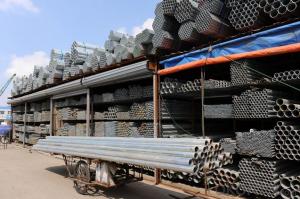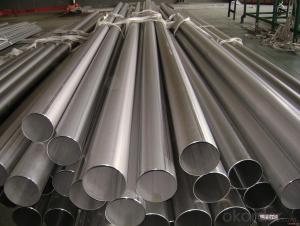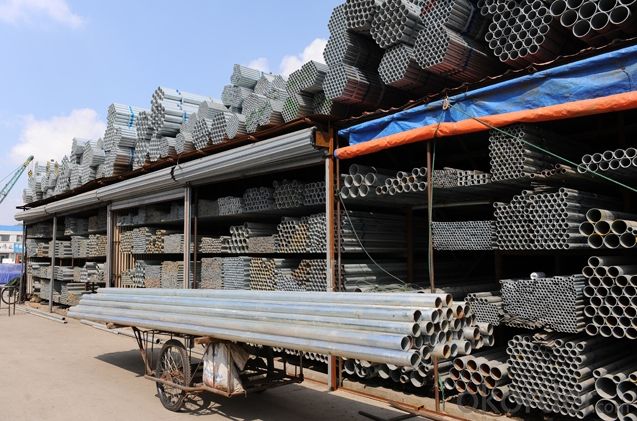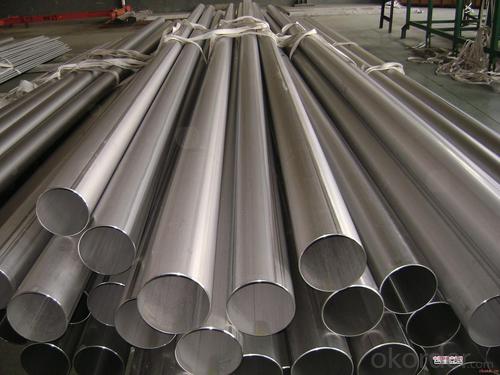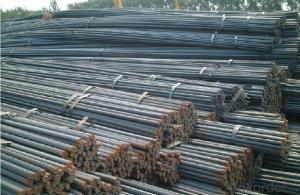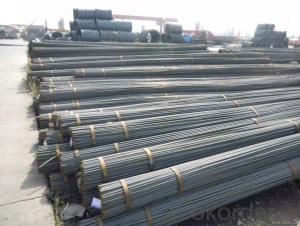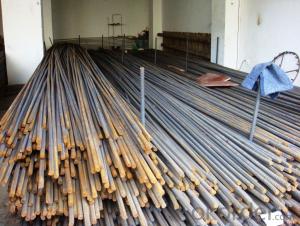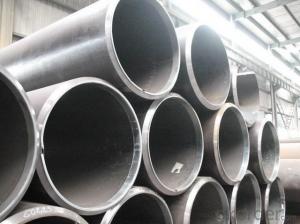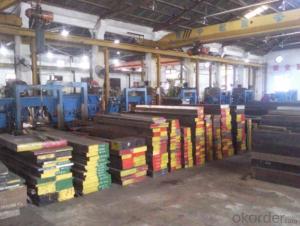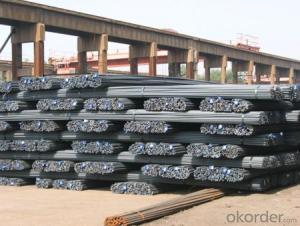Steels Manufacture Building Material from China on Sale
- Loading Port:
- Tianjin
- Payment Terms:
- TT OR LC
- Min Order Qty:
- 100 m.t
- Supply Capability:
- 1000 m.t/month
OKorder Service Pledge
OKorder Financial Service
You Might Also Like
1.Packaging & Delivery
Packaging Detail: | in bundles or as customer's requirement |
Delivery Detail: | Within 30days after receiving your deposit or copy of L/C |
2.Specifications
HRB400,HRB500 Steel Rebars
1.China direct supplier
2.Best service
3.Competitive price
4.Quantity assured
3.Product Description
Name | High Tensile Export Reinforcing Steel Bar ,Deformed Steel Bar ,HRB400B,HRB,46B,HRB500 Building Construction Material |
Standard | ASTM A615 /BS BS 4449 /GB HRB/ JIS G3112 |
Grade | A615 Gr40/60/75 BS 4449 Gr460,B500 GB HRB335,HRB400 ,HRB500
JIS G3112 SD390
|
Diameter | 6mm-40mm |
Length | 6-12m |
Technique | Low temperature hot-rolling reinforcing deformed steel rebar |
Tolerance | As the standard or as your requirement |
Application | Building, construction, road, bridge,etc |
Certificated | BV |
MOQ | 500tons per size steel rebar |
Packing details | Steel rebar packed in bundle or as your requirement |
Delivery | Within 30 days after deposit |
Payment | T/T or L/C |
4.Chemical Composition
Grade | Technical data of the original chemical composition (%) | |||||||
C | Mn | Si | S | P | V | |||
HRB400 | ≤0.25 | ≤1.60 | ≤0.80 | ≤0.045 | ≤0.045 | 0.04-0.12 | ||
Physics capability | ||||||||
Yield Strength(N/cm2) | Tensile Strength(N/cm2) | Elongation (%)
| ||||||
≥400 | ≥470 | ≥14 | ||||||
Grade | Technical data of the original chemical composition (%) | |||||||
C | Mn | Si | S | P | V | |||
HRB500 | ≤0.25 | ≤1.60 | ≤0.80 | ≤0.045 | ≤0.045 | 0.04-0.12 | ||
Physics capability | ||||||||
≥500 | ≥630 | ≥12 | ||||||
5. Theorectical weight
Diameter (MM) | Cross Sectional Area (MM2) | Theorectical Weight (KG/M) | Weight of 12M Bar (KG) | A Ton Contains 12M Bars (PCS) |
6 | 28.27 | 0.222 | 2.664 | 375.38 |
8 | 50.27 | 0.395 | 4.74 | 210.97 |
10 | 78.54 | 0.617 | 7.404 | 135.06 |
12 | 113.1 | 0.888 | 10.656 | 93.84 |
14 | 153.9 | 1.21 | 14.52 | 68.87 |
16 | 201.1 | 1.58 | 18.96 | 52.74 |
18 | 254.5 | 2 | 24 | 41.67 |
20 | 314.2 | 2.47 | 29.64 | 33.74 |
22 | 380.1 | 2.98 | 35.76 | 27.96 |
25 | 490.9 | 3.85 | 46.2 | 21.65 |
28 | 615.8 | 4.83 | 57.96 | 17.25 |
32 | 804.2 | 6.31 | 75.72 | 13.21 |
36 | 1018 | 7.99 | 98.88 | 10.43 |
40 | 1257 | 9.87 | 118.44 | 8.44 |
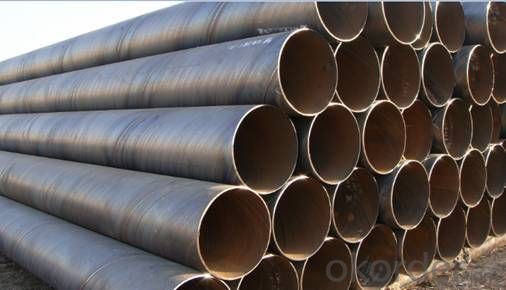
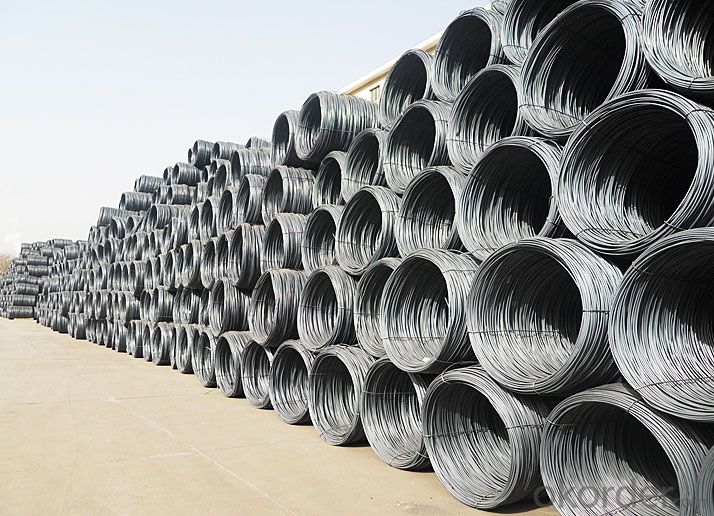
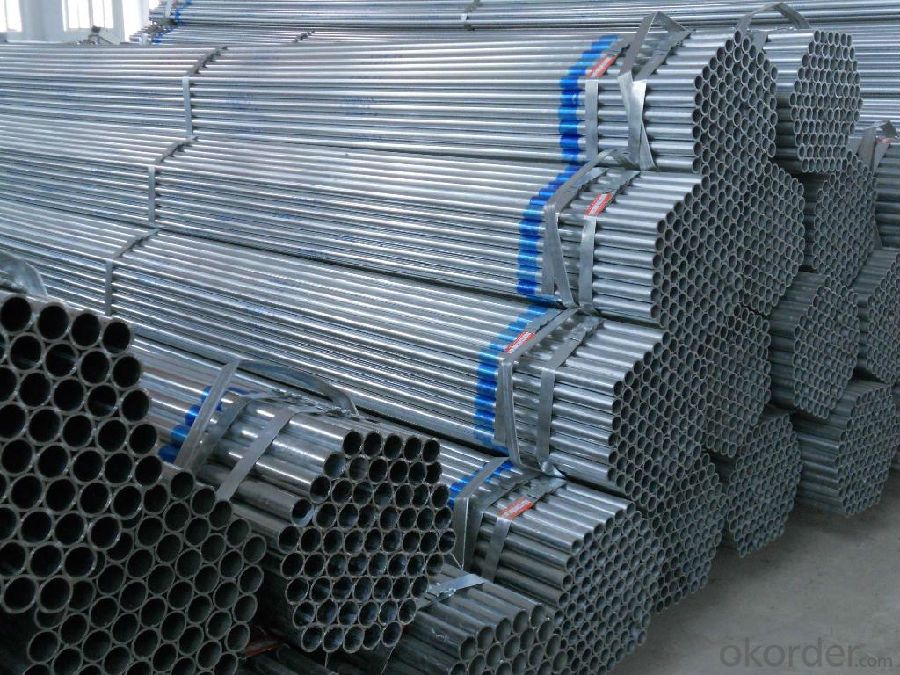
- Q: Are steel pipes suitable for underground compressed air systems?
- Yes, steel pipes are generally suitable for underground compressed air systems. Steel pipes have several advantages that make them a popular choice for such applications. Firstly, steel pipes are known for their high strength and durability, which allows them to withstand the pressure and stress associated with compressed air systems. They can handle high operating pressures without any significant risk of bursting or leaking. Secondly, steel pipes have excellent resistance to corrosion and can withstand exposure to moisture, soil, and other underground elements. This makes them a reliable choice for underground installations, where pipes may be exposed to moisture and other potentially corrosive substances. Furthermore, steel pipes are relatively easy to install and maintain. They can be welded or threaded together, ensuring a secure and leak-free connection. Additionally, steel pipes can be easily inspected and repaired if necessary, allowing for cost-effective maintenance and repairs. However, it is important to note that the suitability of steel pipes for underground compressed air systems may also depend on other factors such as the specific requirements and conditions of the system. It is advisable to consult with a professional engineer or a qualified expert to ensure that steel pipes are the most appropriate choice for a specific application.
- Q: How do you calculate the pipe volume flow rate for steel pipes?
- To calculate the volume flow rate of steel pipes, you need to consider the pipe's diameter and fluid velocity. The formula used for this calculation is Q = A * V, where Q represents the volume flow rate, A is the cross-sectional area of the pipe, and V is the fluid velocity. To start, you need to determine the cross-sectional area of the pipe. For a circular pipe, you can use the formula A = π * r², where A is the area and r is the radius of the pipe. If the diameter of the pipe is given, you can simply divide it by 2 to obtain the radius. Next, you need to determine the fluid velocity. This can be done by measuring the velocity directly using a flowmeter or by calculating it based on the fluid's properties and the pressure drop across the pipe using the Bernoulli equation or other appropriate equations. Once you have both the cross-sectional area and fluid velocity, you can multiply them together to find the volume flow rate. Make sure the units are consistent throughout the calculation. For example, if the area is in square meters and the velocity is in meters per second, the resulting volume flow rate will be in cubic meters per second. It is worth noting that the calculation assumes the fluid is incompressible and flows steadily through the pipe. If the fluid properties or flow conditions change, additional considerations may be required to accurately calculate the volume flow rate.
- Q: What are the common applications of galvanized steel pipes?
- Galvanized steel pipes are commonly used in various industries and applications such as plumbing, water supply systems, gas pipelines, electrical conduits, construction projects, fencing, and outdoor structures. The galvanization process adds a protective zinc coating to the steel, making it resistant to corrosion and extending its lifespan, making it ideal for applications requiring durability and longevity.
- Q: How to perform nondestructive inspection of steel tubes
- Including fluorescence, coloring two kinds. Because of its simple equipment and convenient operation, it is an effective method to check the surface defect of magnetic particle inspection. It is mainly used for surface defect inspection of non-magnetic materials.
- Q: Can steel pipes be used for underground heat exchange systems?
- Yes, steel pipes can be used for underground heat exchange systems. Steel pipes are commonly used for this purpose due to their durability and resistance to corrosion. They can effectively transport and exchange heat in underground systems, making them a suitable choice for such applications.
- Q: Can steel pipes be used for gas transportation?
- Gas transportation can indeed employ steel pipes. Steel is frequently chosen as the material for gas pipelines due to its robustness, longevity, and resistance to corrosion. High pressures are withstood by steel pipes, rendering them suitable for conveying both natural gas and propane. Their ability to endure extreme temperatures further enhances their suitability for gas transportation across diverse settings. Moreover, steel pipes can be seamlessly welded together to create a continuous pipeline system. Nonetheless, it is crucial to guarantee that the steel pipes employed for gas transportation are adequately coated and shielded against corrosion to avert any leakage or pipeline harm.
- Q: Are steel pipes resistant to impact?
- Yes, steel pipes are generally resistant to impact due to their high strength and durability. They can withstand external forces and are less likely to deform or break upon impact compared to other materials.
- Q: What is the lifespan of steel pipes?
- The lifespan of steel pipes can vary depending on various factors such as the quality of the steel used, the environment in which they are installed, and the maintenance and care given to them. However, generally speaking, steel pipes can have a lifespan ranging from 20 to 100 years or even longer if properly maintained and protected against corrosion.
- Q: There are multiple welded galvanized steel pipe outer diameter 108mm wall thickness 4mm length of 6 meters
- Formula for calculating weight of welded steel pipe:Kg/m= (outside diameter mm-, wall thickness mm) * wall thickness mm*0.02466= (108-4) *4*0.02466=10.26 kg / MBecause of galvanizing, the weight is heavier than that of ordinary welded pipe 3%~6%.Therefore, the length of 6 meters galvanized steel pipe weighs about 10.26*6*1.06=65 kilograms
- Q: How are steel pipes used in sewage systems?
- Steel pipes are commonly used in sewage systems due to their durability and strength. They are used to transport sewage from homes, businesses, and industries to treatment plants or disposal sites. Steel pipes are able to handle the corrosive nature of sewage and are resistant to various chemicals and pressure. Additionally, they are also used for the construction of manholes, pumping stations, and other sewage system infrastructure.
Send your message to us
Steels Manufacture Building Material from China on Sale
- Loading Port:
- Tianjin
- Payment Terms:
- TT OR LC
- Min Order Qty:
- 100 m.t
- Supply Capability:
- 1000 m.t/month
OKorder Service Pledge
OKorder Financial Service
Similar products
Hot products
Hot Searches
Related keywords
